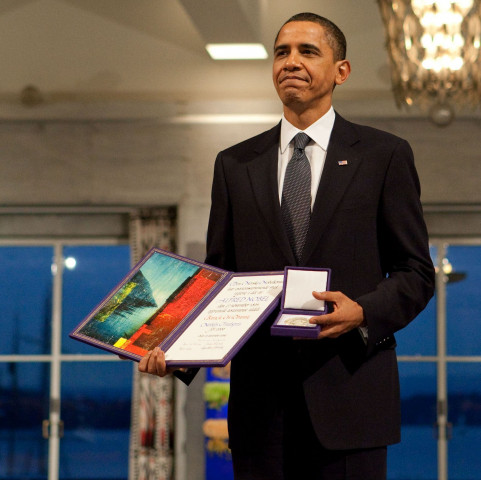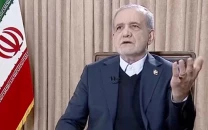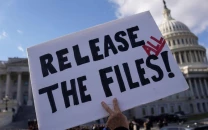10 most controversial Nobel Prize winners
The prestigious peace prize was set up, interestingly, by the inventor of dynamite and other explosives

PHOTO: WHITE HOUSE
Alfred Nobel, who was Swedish by origin, was a business leader, engineer, scientist, and, interestingly, the inventor of dynamite and other explosives.
The Nobel prizes were set up to honour men and women who make outstanding achievements in Physics, Chemistry, Medicine, and Literature and for efforts made toward peace.
According to Alfred Nobel's will, the Nobel prizes were to be awarded to "those who, during the preceding year, shall have conferred the greatest benefit on mankind."
Often, the Nobel Prize is scrutinised for being presented to politicians and bringing international conflicts into public focus.
Here are, in no particular order, 10 of the most controversial Nobel Prize laureates:
1. Henry A Kissinger
 PHOTO: AFP
PHOTO: AFPThe former US secretary of state was awarded the Nobel Peace Prize in 1973 which was to be shared with Vietnames leader Le Duc Tho for their efforts in bringing peace. The latter rejected the award as he did not feel peace had been achieved and did not want to share the award with Kissinger.
The award was also controversial because Kissinger was accused of playing a role in America's secret bombing of Cambodia in 1969 and 1975.
2. Yasser Arafat
 PHOTO: AFP
PHOTO: AFPWhile views may conflict when it comes to Yasser Arafat, he is in fact a Nobel peace prize laureate. He shared the 1994 prize with then Israeli prime minister Yitzhak Rabin and foreign minister Shimon Peres for their work on the Oslo Accords which promoted development and fraternity in the Middle East.
3. Shimon Peres
 PHOTO: AFP
PHOTO: AFPShimon Peres was responsible for establishing Israel's nuclear weapons arsenal and was also blamed for the 1996 shelling of Qana.
4. Fritz Haber
 PHOTO: NOBELPRIZE.ORG
PHOTO: NOBELPRIZE.ORGAwarded the prize for his discoveries in chemistry, specifically 'synthesising ammonia', which enabled modern day food growth by way of synthetic fertilizer. Prior to that, Haber was involved in the development of poisonous gasses, which went on to kill millions of people in World War 1, used by the Nazis. His wife killed herself merely 10 days after the first instance of chemical warfare.
5. European Union

- PHOTO: AFP
The award was widely criticised because it came at a time when social rights were suffering greatly due to discord between member states resulting from economic crisis.
6. John Forbes Nash
 PHOTO: WIKIPEDIA
PHOTO: WIKIPEDIAAwarded for his economic contributions, Nash's award was criticised due to his history of mental illness and suspected anti-semitisim. Nash was portrayed by Russel Crowe in the Oscar winning film A Beautiful Mind.
7. Jimmy Carter
 PHOTO: AFP
PHOTO: AFPCarter was awarded the Peace prize for "decades of untiring effort to find peaceful solutions to international conflicts, to advance democracy and human rights, and to promote economic and social development." It was very controversial because it was awarded right after the US senate authorised use of military force against Iraq to enforce UN resolutions.
8. Johannes Andreas Grib Fibiger
 PHOTO: Brittanica
PHOTO: BrittanicaA Danish scientist found that by feeding cockroaches, infected with a species of worms, to rats, he could induce abnormal cell growth. He concluded that the worms caused cancer. He was received 16 nominations and was awarded in 1926. A decade later, research proved that his conclusions were wrong. In 2004, the Nobel Prize awarding committee for medicine also admitted that Fibiger’s finding were inaccurate.
9. Rigoberta Menchu
- PHOTO: AFP
A Guatemalan activist and indigenous leader got the award for her book ‘I, Rigoberta Menchu’ -in which it was later revealed - she had altered truths about her life.
10. Barack Obama
 PHOTO: AFP
PHOTO: AFPThe day before he was awarded the Nobel Prize for his inspiring commitment to peace, the Pentagon announced it was accelerating delivery of the most lethal non-nuclear weapons in the arsenal: 13-ton bombs for B-2 and B-52 stealth bombers, designed to destroy deeply hidden bunkers shielded by 10,000 pounds of reinforced concrete. It's no secret the bunker busters could be deployed against Iran, said Chomsky in an article.
The prize "seemed a kind of prayer and encouragement by the Nobel committee for future endeavor and more consensual American leadership," Steven Erlanger and Sheryl Gay Stolberg wrote in The New York Times.




1721969212-0/BeFunky-collage]-(35)1721969212-0-208x130.webp)














COMMENTS
Comments are moderated and generally will be posted if they are on-topic and not abusive.
For more information, please see our Comments FAQ